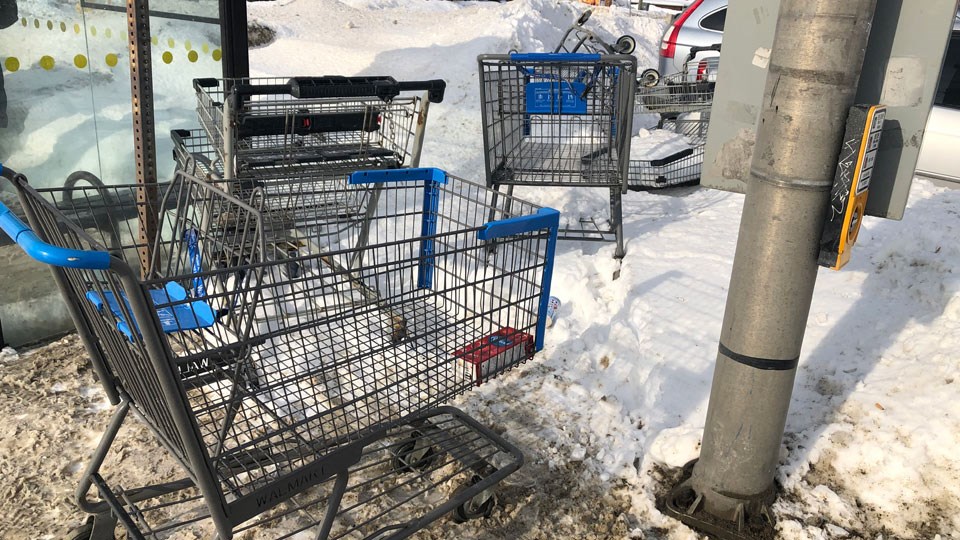THUNDER BAY – Local grocery stores will be made responsible for abandoned shopping carts, after Thunder Bay’s city council approved in principle a new bylaw Monday night.
The new rules will require stores to submit plans to prevent theft and recover stray carts – and pay a fee for their return, if picked up by city staff.
The bylaw comes as a response to a complaint from a local business owner, with councillors agreeing abandoned carts are a nuisance that can block sidewalks and transit stops and reflect badly on the city’s image.
Coun. Peng You called the recommended approach a good “compromise” that held stores accountable without being overly punitive. Unlike rules in some other cities, Thunder Bay will not levy fines on businesses or individuals.
He also suggested more could be done to address the problem, like subsidizing collapsible carts or carriers for those who currently turn to shopping carts, or moving bus stops closer to grocery store entrances.
Some councillors bristled at the framing of the issue, arguing individuals should be held responsible for what amounted to theft.
“I know the police are extremely busy, but is there not some way that when people have shopping carts off the property of the retailer, that police or someone could stop them?” asked Coun. Trevor Giertuga. “I mean, they’re in possession of stolen property at that point… that’s not acceptable.”
Vincent suggested that would challenging, saying bylaw officers aren’t authorized to stop someone simply because they’re in possession of a shopping cart, while police might not have resources to dedicate to the issue.
He also recommended against fining individuals, saying it would disproportionately target the homeless and those on low incomes, but wouldn’t necessarily be effective in changing behaviour.
“I certainly think if we targeted the people who took the carts, whether directly or indirectly, we’re going to be targeting people who are more vulnerable,” he told councillors.
Other Canadian cities have drawn pushback over bylaws that fine users or ban carts in public places, for similar reasons.
In 2018, the city of Vernon backed off a proposed bylaw after objections from the B.C. Civil Liberties Association, for example.
Coun. Rebecca Johnson agreed the city’s efforts should address the element of theft, however, suggesting “an education component for people who are taking” carts.
Coun. Shelby Ch’ng questioned the effectiveness of that approach.
“People don’t necessarily want to be taking the carts out,” she said. “They take the carts out of necessity because they don’t have a vehicle. For a mother with three kids trying to grocery shop, using public transit, education really isn’t the problem.”
Many grocery stores are owned by "well-heeled" national and multi-national companies, said Mayor Bill Mauro, and likely were already following similar rules in other communities.
Some local stores already have solutions in place that could, at least partially, satisfy the new requirements: Safeway uses a system called Gatekeeper that locks a cart’s wheels when it leaves the property; Carts at the Real Canadian Superstore require a coin deposit.
And many stores already take steps to recover carts, which cost an average of around $300, said Vincent.
Council is set to consider a draft bylaw by November.
Some details have already been established: Stores will be required to submit a "shopping cart control and recovery plan" to the city by May 31, 2022. The city will offer businesses more specific criteria for the plans by the end of November.
The bylaw will also introduce a fee for the return of carts picked up by city staff, and require stores to label carts with their name and contact information.
The new rules will be reviewed after three years.
